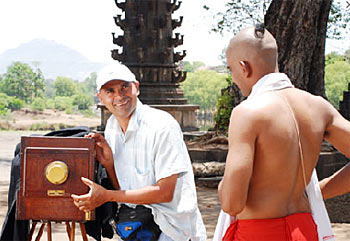
This year, the modest Marathi film Harishchandrachi Factory has been selected as India's official entry for the 82nd Annual Academy Awards. Helmed by first-time director Paresh Mokashi, the film introduces the pioneer of Indian cinema, Dada Saheb Phalke, in an entertaining manner.
Mokashi -- who has written and directed Marathi plays like Sangeet Debunchya Muli, Mukkampost Bombilwadi and Lagnakallol over 20 years -- tells Patcy N what difficulties he faced while making this brilliant film, and his plan on making the film shine in Hollywood.
Firstly, tell us about yourself.
I have been associated with a theatre group called Theatre Academy in Pune. I have acted and directed plays in Marathi. I was born in Lonavala (a hill station near Mumbai).
What preparations have you done for the Oscars?
We are still figuring that out. We are doing our homework. UTV and Paprika Media will help us out for the Oscars. We will go to the US next month. We are speaking to directors and producers, who have promoted their films at the Oscars earlier.
What made you choose Dada Saheb Phalke as the subject for your film?Why not? Nobody has made a movie on Dada Saheb before. I read his biography and learnt of his adventures of making movies. Today's generation don't know what about Dada Saheb went through to make India's first feature film (Raja Harishchandra). We just know him as the person on whose name awards are given out, or that he is the pioneer of Indian cinema. Our knowledge of Phalke ends there. But when I came across a biography and discovered his funny adventures, I decided to make a film on him.
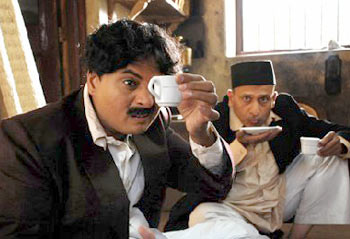
What made you choose the period between 1911 and 1913 only when Phalke made Raja Harishchandra, and not his entire life?
My film is about the making of India's first feature film. I choose his life from 1911 to 1913 because I was attracted to this portion of his life when he made Raja Harishchandra. Also, because it is the most important thing in his life as well as in Indian history. By concentrating on this portion, I have brought out the details of that adventure. If I had made a film on his entire life, this chapter -- and the adventure -- would have been lost in 10-15 minutes.
What research have you done on the subject?
There is not much material on Phalke, unfortunately. There are a couple of biographies. There is some material available on the National Film Archives at the Film and Television Institute in Pune. I have also talked to a few people on this topic. Because there was not much material available, it was up to me how to portray Phalke.
So how much of the film is fact and how much is fiction?
The milestone events shown in the film have actually happened. When his son got hurt during the film shoot and Phalke continued shooting is true. But biographies don't tell you the dialogues, so that was up to me.
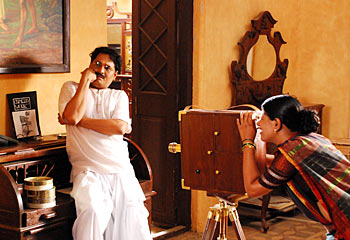
How did you arrange funds for your film?
I wrote the script in 2005. Producers were not convinced about the way I wanted to make the film. They wanted to add songs and dance, change the script, make it with big actors... but I was not ready for that. So I decided to put in my own money.
I had to sell my house to collect funds. But I won't like to talk about it. Phalke had done that too, and so did many first-time directors who go through the similar financial problems.
Phalke's family was his greatest support -- his wife and children always stood by him.
Like Phalke, I got a lot of support from my family. My parents, brother, cousins and friends stood by me. I am not married.
All the actors in the film -- besides Phalke and his family -- have small roles. They are big names in theatre, yet they acted in the movies.
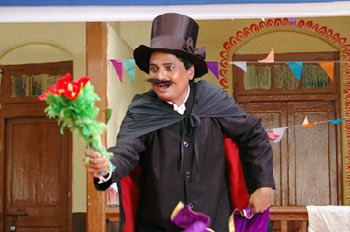
How did you cast your film?
I cast my film in 2005 itself. These people have been with me during the entire time from 2005 to 2008 when the film went on the floors. They did not walk out in those three years. They believed in the subject, which was important, because you can get emotional support but you need people who believe in you and your work.
I did not hold auditions, as I don't believe in that. I took people who had acted in my plays. Nandu Madhav (who played Phalke) and Vibhawari Deshpande (who played Mrs Phalke) fit the bill.
How long did the film take to get made?
We shot for 60 days. We finished the post production work in eight months in 2008.
We had a London schedule as well when Phalke went to buy a camera for himself. Once shooting began, there were no difficulties.
We had a technical release in the remote places of Maharashtra so we could participate in various festivals across the country. We won many awards. People started publicising the movie through word of mouth and that helped a lot. We will have a wide commercial release in December.
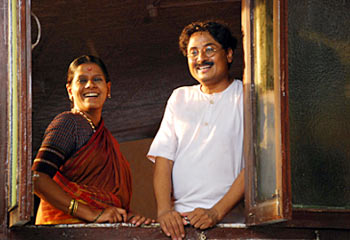
Even though Phalke went through a rough patch making the film, your film has a light, comic vein. What made you think Phalke had a good sense of humour?
The biographies were not written in a comical fashion. But after reading up, I had to guess from those chain of events that if the person has done all this, what kind of person would he be like?
Other directors may have portrayed him seriously but this is Paresh Mokashi's Phalke. We know for a fact that he performed magic shows for children and called himself Professor Kelpha (Phalke read in reverse). To do such a thing, the man had to be funny.
Why did not you make film in Hindi?
People who don't know Marathi have reacted to it positively. So the content is good. If I had made the film in Hindi, I'm sure it would have made more money. We will have added English subtitles. Later, we will get the film dubbed.